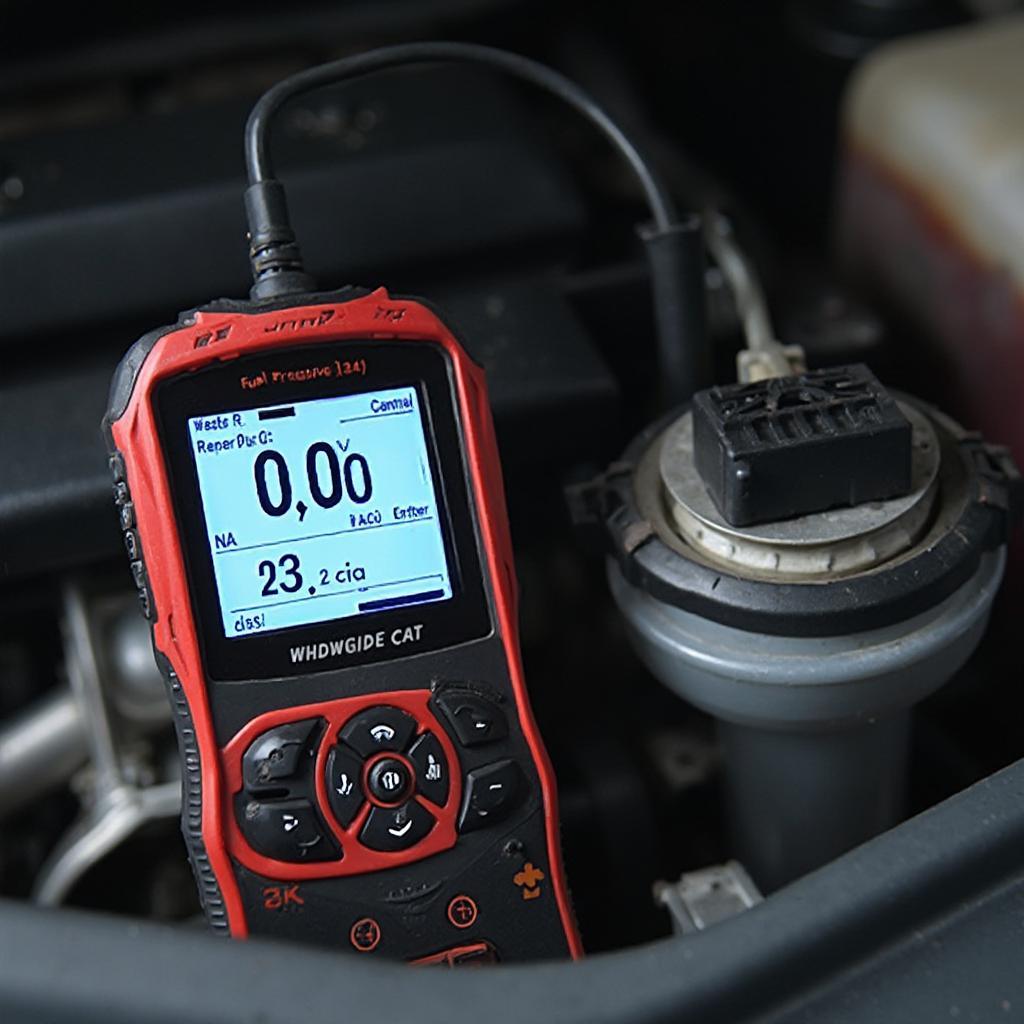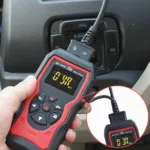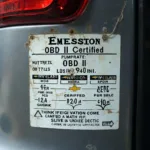An OBD2 scanner can be a powerful tool for diagnosing car problems, including potential fuel pump issues. While it can’t directly test the pump itself, it offers valuable clues about its performance. Let’s explore how using an OBD2 scanner to check fuel pump performance can save you time and money. Using an OBD2 scanner effectively can pinpoint fuel-related problems, helping you decide if a trip to the mechanic is necessary.
Understanding the OBD2 Scanner’s Role in Fuel Pump Diagnostics
 OBD2 Scanner Checking Fuel Pressure
OBD2 Scanner Checking Fuel Pressure
An OBD2 scanner doesn’t directly measure fuel pressure. Instead, it reads data from various sensors, including the oxygen sensor (O2), mass airflow sensor (MAF), and manifold absolute pressure (MAP) sensor. These readings can indirectly indicate a failing fuel pump. For example, low fuel pressure can cause a lean fuel mixture, which the O2 sensor will detect. This information, displayed as an OBD2 code, can point towards a potential fuel pump problem. obd2 code reader p0442.
Can an OBD2 scanner test a fuel pump directly?
No, an OBD2 scanner cannot directly test a fuel pump. It relies on data from other sensors to infer fuel pump performance.
What are common OBD2 codes related to fuel pump issues?
Codes such as P0171, P0174 (lean fuel mixture), P0201-P0204 (injector circuit malfunction), and P0440-P0457 (evaporative emission system) can sometimes indicate fuel pump problems. However, these codes can also be triggered by other issues.
Using an OBD2 Scanner to Identify Potential Fuel Pump Problems
First, connect your dash boss obd2 scanner to your car’s diagnostic port. Turn the ignition to the “on” position without starting the engine. Retrieve the diagnostic trouble codes (DTCs) using the scanner. Look for codes related to fuel system performance, such as those mentioned earlier. obd2 fault code p0125. Remember, these codes are not definitive proof of a bad fuel pump, but they can provide valuable clues.
How do I interpret the codes from my OBD2 scanner?
Use a reliable online resource or a repair manual to understand the meaning of the codes and their potential causes.
What should I do if my OBD2 scanner shows a fuel-related code?
Further investigation is necessary. While the fuel pump might be the culprit, other issues, such as clogged fuel filters or faulty injectors, could also trigger these codes.
Beyond the OBD2 Scanner: Further Steps for Diagnosing Fuel Pump Problems
If your OBD2 scanner reveals potential fuel-related issues, further testing is crucial. A fuel pressure test using a mechanical gauge is the most accurate way to assess fuel pump performance. This involves connecting a gauge to the fuel rail and measuring the pressure. Consult a repair manual for the correct fuel pressure specifications for your vehicle.
“A proper fuel pressure test is essential for accurate diagnosis. Don’t rely solely on OBD2 codes,” advises John Miller, a certified master automotive technician with over 20 years of experience.
“Remember, the OBD2 scanner is a starting point. It helps guide you towards the potential problem area, but further testing is always necessary,” adds Susan Davis, an automotive instructor and diagnostics expert. qx56 obd2 code p1168 & p1051. Consider using an obd2 tool to monitor engine temperature sensor in conjunction with your scanner for a more comprehensive picture of your engine’s performance.
Conclusion
Using an OBD2 scanner to check fuel pump related issues can be a valuable first step in diagnosing car problems. While it doesn’t directly test the fuel pump, it can offer vital clues about its performance by highlighting related issues within the fuel system. By understanding the limitations and capabilities of your OBD2 scanner, you can effectively use it to troubleshoot potential fuel pump problems and determine the next steps in your diagnostic process.
FAQ
- Can I replace a fuel pump myself? Replacing a fuel pump can be challenging and requires mechanical knowledge.
- How much does a fuel pump replacement cost? The cost varies depending on the vehicle and labor rates.
- What are the signs of a failing fuel pump? Symptoms include sputtering, difficulty starting, and reduced engine power.
- How long do fuel pumps typically last? Lifespan varies, but many last for several years.
- Can a clogged fuel filter cause similar symptoms to a bad fuel pump? Yes, both can cause fuel delivery problems.
- What other components can affect fuel pressure readings? Faulty fuel pressure regulators and leaky fuel lines can also impact readings.
- How can I prevent fuel pump problems? Regular maintenance, including fuel filter replacements, can help.
If you need assistance, please contact us via WhatsApp: +1(641)206-8880, Email: [email protected] or visit us at 789 Elm Street, San Francisco, CA 94102, USA. We have a 24/7 customer service team.

